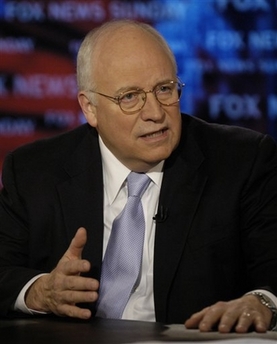Bush, Cheney press for Iraq policy
(AP)Updated: 2007-01-15 08:47
WASHINGTON - Digging in for confrontation, President Bush and Vice President Dick Cheney said they will not budge from sending thousands more US troops to Iraq no matter how much Congress opposes it.
 US Vice President Dick Cheney is interviewed on Fox News Sunday in Washington Sunday, Jan. 14, 2007. [AP]  |
A defiant Cheney said Sunday that majority Democrats have offered no credible alternative to Bush's revised war strategy. Cheney said withdrawing from Iraq would mean giving in to al-Qaida leader Osama bin Laden and other US enemies.
"They're convinced that the United States will, in fact, pack it in and go home if they just kill enough of us," Cheney said. "They can't beat us in a standup fight, but they think they can break our will."
The aggressive White House reaction comes as both the House and Senate prepare to vote on resolutions that oppose additional US troops in Iraq. Cheney said those nonbinding votes by Congress would not affect Bush's ability to act as he sees fit.
"You cannot run a war by committee," the vice president said.
Those postelection promises of bipartisanship seem quite distant today.
The White House, also seeing some GOP support peal away for the war plan, went all-out to regain some footing. Bush gave his first interview from Camp David, airing Sunday night on CBS' "60 Minutes," while Cheney and national security adviser Stephen Hadley made the rounds of the morning talk shows.
Lawmakers hardened their stance, too, pledging to explore all ways possible to stop Bush.
Beyond the promised votes in opposition to the president's approach, the Democratic leadership is considering whether, and how, to cut off funding for additional troops.
"You don't like to micromanage the Defense Department, but we have to, in this case, because they're not paying attention to the public," said Rep. John Murtha, a Pennsylvania Democrat who helps oversee military funding.
"We need to look at what options we have available to constrain the president," said Democratic Sen. Barack Obama of Illinois, a possible White House candidate in 2008. Democrats are wary, though, of appearing to undermine the troops that are already in Iraq.
It is unclear how any effort by Congress would affect Bush's plan to send more troops to Iraq. Hadley said the White House already has money appropriated by Congress to move the additional forces to Iraq "and the president will be doing that."
GOP Sen. John McCain of Arizona, a potential 2008 presidential contender who endorses Bush's call for more troops, said votes to express disapproval were pointless. "If they're dead serious," he said of those fighting Bush's strategy, "then we should have a motion to cut off funding."
The Bush administration had hoped that the president's overhauled strategy
would lead to some bipartisan unity. Or, in the least, that it would get an
extended hearing and debate before legislative leaders made up their minds.
| 1 | 2 |  |
|
||
|
||
|
|